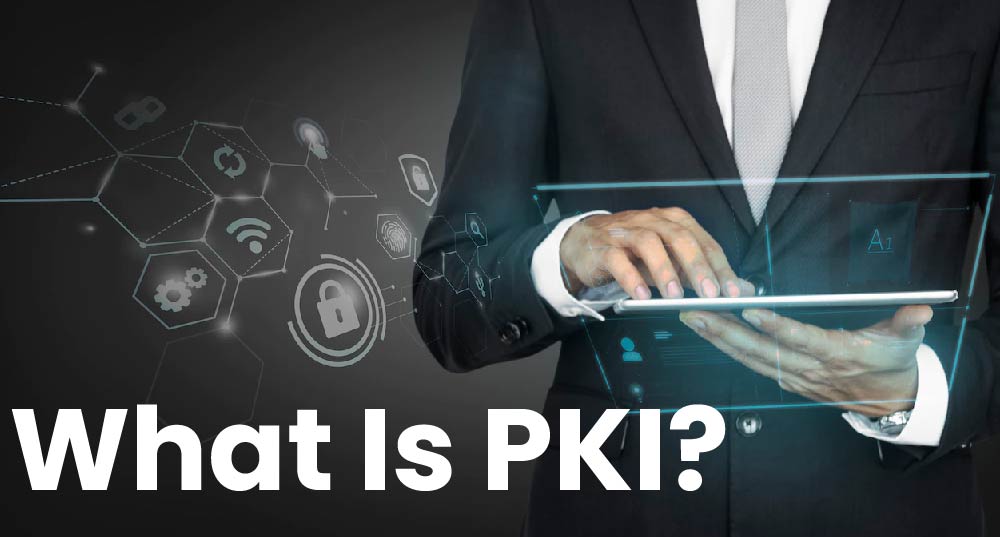Public Key Infrastructure (PKI) is a system of digital certificates, cryptographic keys, and trusted third-party authorities that are used to secure electronic communications and transactions. PKI uses a combination of private and public key encryption to secure data and ensure that only authorized parties can access it.
PKI also includes a system of trusted third-party certificate authorities that issue and manage digital certificates, which are used to authenticate the identity of the parties involved in a transaction.

How does PKI work?
PKI works by using a pair of encryption keys, one public and one private, to secure data. The private key is kept secret by the owner and is used to decrypt data that was encrypted with the corresponding public key. The public key, on the other hand, can be shared with others and is used to encrypt data. The process of encrypting and decrypting data with these keys ensures that only authorized parties can access it.
PKI is an essential tool for keeping our digital lives secure, and it is used in a wide range of applications beyond just securing website communications. From securing email and financial transactions to protecting our personal privacy through IoT devices, PKI is a vital component of our digital security infrastructure.

Use Cases of Public Key Infrastructure (PKI)
Refers and credit to a blogpost from Digicert; Digital signatures, encrypted and authenticated email communications, and physical and virtual smart card authentication are some of the use cases for Public Key Infrastructure (PKI).
We had summarize what we had studied from Digicert blogpost – “3 SURPRISING USES OF PKI IN BIG COMPANIES AND HOW TO ENSURE THEY ARE ALL SECURE”
Digital signatures:
PKI allows for digital signing of important documents, such as contracts, to ensure that the signature is genuine, the document has not been tampered with, and that only authorized parties can access it. Digital signature platforms that use PKI should allow for document authorship, data/content integrity, certificate and signing management, and the confirmation of the identity of the sender.
Encrypted and authenticated email communications:
PKI can be used to encrypt and authenticate email communications, ensuring that the contents of the email are private and that the recipient can verify that it came from the sender. This is particularly important for organizations that handle sensitive personal information, as it ensures compliance with regulations like the EU’s GDPR or California’s CCPA.
Physical and virtual smart card authentication:
Smart cards are becoming more common across various industries, such as healthcare, where they can help reduce data breaches and fraud, provide better data capture, and place authentication and data access in the hands of employees themselves. PKI can be used to provide a secure, chip-based system that can be stored on an employee’s mobile device, reducing the likelihood of patient data leakage.
Other uses of Public Key Infrastructure (PKI)
Secure Email: PKI is often used to secure email communication, by providing digital signatures and encryption for messages. This ensures that only the intended recipient can read the email, and that the sender is who they claim to be.
Banking and Financial Transactions: PKI is also used in the banking and finance industry to secure online transactions and protect sensitive financial information. Banks and other financial institutions use PKI to authenticate customers and to ensure that transactions are secure and tamper-proof.
Internet of Things (IoT) devices: PKI is increasingly being used to secure IoT devices, such as smart home devices, connected cars, and medical devices. These devices often collect and transmit sensitive personal information, so using PKI to secure the communication and control access to these devices is critical to protect individuals’ privacy.

Do I need Public Key Infrastructure?
PKI is used by a wide range of organizations and individuals to secure electronic communications and transactions. Some examples of who may need PKI include:
Businesses: Companies that handle sensitive information, such as financial data or personal information, may use PKI to secure their communications and transactions. This can include online shopping websites, banks, and other financial institutions.
Government agencies: PKI is often used by government agencies to secure communications and transactions that involve sensitive information. This can include things like tax returns, social security numbers, and other personal information.
Healthcare organizations: PKI is used by healthcare organizations to secure sensitive medical information and protect patient privacy. This can include things like electronic health records, medical device communications, and telemedicine.
IoT device manufacturers: PKI can be used to secure Internet of Things (IoT) devices, such as smart home devices and connected cars. This is important because these devices often collect and transmit sensitive personal information.
Individuals: PKI can be used by individuals to secure their online communications and transactions, such as online banking, email, and social media.
Overall, PKI is used by a wide range of organizations and individuals to secure electronic communications and transactions. It plays a vital role in keeping our digital lives secure by ensuring the authenticity and confidentiality of the data exchanged between parties.

Conclusion
In summary, PKI is a security system that uses digital certificates, encryption keys, and trusted third-party authorities to secure electronic communications and transactions. It plays a vital role in keeping our digital lives secure by ensuring the authenticity and confidentiality of the data exchanged between parties.

Author: Chan Kang

